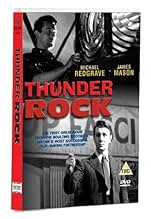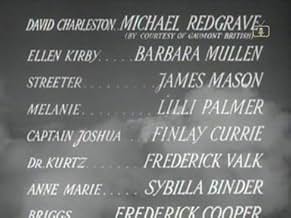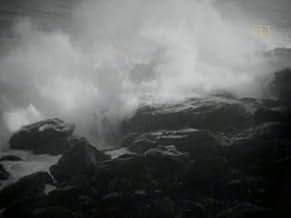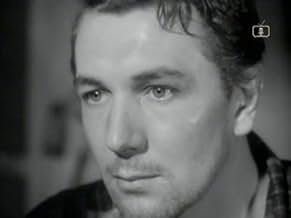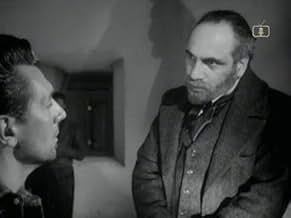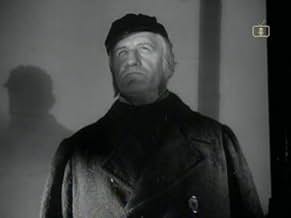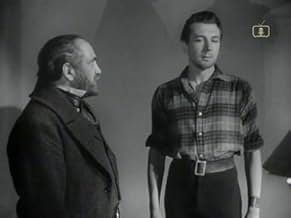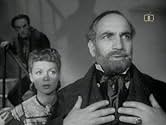Adicionar um enredo no seu idiomaCynical, embittered newspaperman David Charleston (Michael Redgrave) is tormented, then inspired, by visions he keeps having of people who have drowned.Cynical, embittered newspaperman David Charleston (Michael Redgrave) is tormented, then inspired, by visions he keeps having of people who have drowned.Cynical, embittered newspaperman David Charleston (Michael Redgrave) is tormented, then inspired, by visions he keeps having of people who have drowned.
- Direção
- Roteiristas
- Artistas
- Prêmios
- 1 vitória no total
Bryan Herbert
- Flanning
- (as Brian Herbert)
Avaliações em destaque
Charleston (Redgrave) lives in self-inflicted isolation as a lighthouse keeper, having become completely disenchanted with the outside world, most of which is complacent in the face of rising evil and looming war. In a dialogue with spirits of the past, he re-evaluates his decision to isolate himself.
Robert Ardrey's 1939 play railed against the widespread complacency at the rise of fascism, and anticipated WWII. That the play flopped in New York on first release and yet did well in wartime London a little later says plenty about how receptive the audience was to the message. In this film adaptation the story is broadened and filled in; it played to packed houses in 1943 America and did well in the UK.
Here the Boulting brothers -perhaps better known for their later comedies- have made an excellent film that is both absorbing and intriguing.
Of course it was made in wartime and the message is played for all it is worth as propaganda. But that doesn't make this film any less interesting or thought provoking. It is a little less overtly metaphysical than some other films from around this time and that is no bad thing; one foot is kept grounded at all times, more or less.
Someone once said "the greatest journeys we go on are those in our own minds" -or words to that effect- and this play/film is testimony to that.
The message that came through most strongly for me was that we owe the past a heavy debt; it is, in the present, always our obligation not to turn away, not to give up or hide away in the face of adversity.
Despite its flaws this film rates a 9/10 from me.
Robert Ardrey's 1939 play railed against the widespread complacency at the rise of fascism, and anticipated WWII. That the play flopped in New York on first release and yet did well in wartime London a little later says plenty about how receptive the audience was to the message. In this film adaptation the story is broadened and filled in; it played to packed houses in 1943 America and did well in the UK.
Here the Boulting brothers -perhaps better known for their later comedies- have made an excellent film that is both absorbing and intriguing.
Of course it was made in wartime and the message is played for all it is worth as propaganda. But that doesn't make this film any less interesting or thought provoking. It is a little less overtly metaphysical than some other films from around this time and that is no bad thing; one foot is kept grounded at all times, more or less.
Someone once said "the greatest journeys we go on are those in our own minds" -or words to that effect- and this play/film is testimony to that.
The message that came through most strongly for me was that we owe the past a heavy debt; it is, in the present, always our obligation not to turn away, not to give up or hide away in the face of adversity.
Despite its flaws this film rates a 9/10 from me.
I saw Thunder Rock as a student in Toronto (Canada)when it came out in about 1942. Thought the plot has faded somewhat in my memory, the acting, the allegorical inferences and the very remarkable optical distortions that said far more than words--all of these have stayed with me for the sixty years since that time.
I'd love to see it revived for viewing.
I'd love to see it revived for viewing.
That this story is an allegory is clear from very early on but the director seems to have wanted to disguise it somehow with unnecessary padding. In doing so he detracts from the overall message and loses his audience a little along the way. Take the opening scenes as an example where a phone call is passed higher and higher through a chain of employees. It's well played, well acted and amusing and of absolutely no relevence whatsoever to the plot. You may as well have had a Donald Duck Cartoon instead and started the film where James Mason lands at the lighthouse.
It achieves some great moments both in and out of it's lighthouse setting, Michael Redgrave is very good but everything just goes on that little bit too long for it's own good.
James Mason stardom puts him near the top of the billing, but he's really only a bit player in this and doesn't make any significant contribution to the overall film.
It achieves some great moments both in and out of it's lighthouse setting, Michael Redgrave is very good but everything just goes on that little bit too long for it's own good.
James Mason stardom puts him near the top of the billing, but he's really only a bit player in this and doesn't make any significant contribution to the overall film.
When the authorities discover a lighthouse keeper is not cashing his paychecks, they go to visit him to make sure he is OK. One of the visitors gets into a chat with the lighthouse keeper, David Charleston and discovers that his desire to stay in the lighthouse is based on the fact that he is in contact with the ghosts from a ship that sunk many years ago; although the ghosts do not know they are dead. Charleston hides away - having been frustrated by those in power ignoring his warnings about fascism. However he finds that each passenger has had similar experiences that he, with the benefit of future knowledge, can learn from.
The point of this film is both obvious but also too obscure. The message of not giving up is laboured at the end, but for the majority of the film, it is hidden and damages the early meaning of the film. The pre-war setting is a morale boosting tale of sticking at it - for we never know what tomorrow will bring; it delivers a reasonable tale but I found it hard to get into the stories of the various passengers as they were not characters I was given a lot of time to get into and care about. The stuff with Charleston himself works better as I cared about him due to the time spent with him.
The film is very stagy however, it doesn't really flow very well at times and the best scenes are played out as if in a theatre. It is rather heavy at times but it still works if you know what to expect. The cast is OK but really it is all Redgrave's film. He exaggerates his performance as if he is on a stage and needing to project to the back row, but he is still very good. Mason has a minor role but always has such a good presence that it is hard to fault him. The support cast of passengers is less assured and really never get close to being real people - instead their dialogue and stories are too heavily laden with meaning.
Overall this is a reasonably good propaganda. It has more meaning and human pathos than most WWII propaganda films as it is not anti-enemy but pro-spirit and persistence. It may all be a little heavy and too stagy but it is enjoyable if you can do enough to get past the heavy message and some overly worthy acting.
The point of this film is both obvious but also too obscure. The message of not giving up is laboured at the end, but for the majority of the film, it is hidden and damages the early meaning of the film. The pre-war setting is a morale boosting tale of sticking at it - for we never know what tomorrow will bring; it delivers a reasonable tale but I found it hard to get into the stories of the various passengers as they were not characters I was given a lot of time to get into and care about. The stuff with Charleston himself works better as I cared about him due to the time spent with him.
The film is very stagy however, it doesn't really flow very well at times and the best scenes are played out as if in a theatre. It is rather heavy at times but it still works if you know what to expect. The cast is OK but really it is all Redgrave's film. He exaggerates his performance as if he is on a stage and needing to project to the back row, but he is still very good. Mason has a minor role but always has such a good presence that it is hard to fault him. The support cast of passengers is less assured and really never get close to being real people - instead their dialogue and stories are too heavily laden with meaning.
Overall this is a reasonably good propaganda. It has more meaning and human pathos than most WWII propaganda films as it is not anti-enemy but pro-spirit and persistence. It may all be a little heavy and too stagy but it is enjoyable if you can do enough to get past the heavy message and some overly worthy acting.
Holy sh*t, was this a peculiar movie! Slow moving but oddly compelling look at a writer's psyche. A war correspondent desperately wants to awaken Britain's awareness of fascism and the inevitable war and dismally fails -- and this is all shown in flashback. The correspondent is shown as an isolated fellow in a lighthouse on the Great Lakes, post-war, who becomes obsessed with the story of drowned immigrants who never reach the lighthouse a hundred years before (get the connection?), dying at sea. And the story then becomes what he imagines their lives to have been, growing in complexity and realism as he comes to terms with his own defeats. I've never seen the writing process so accurately shown in a film as he talks to the characters in his mind and continues to revise their lives before our eyes. An ambitious film that doesn't entirely work, but that I found fascinating and moving. Michael Redgrave is terrific, too, and James Mason, who appears too briefly, has a really cute wave in his hair (ha).
Você sabia?
- CuriosidadesBarbara Mullen (Ellen Kirby) was playing a forty-year-old spinster, yet, she was only twenty-eight.
- Erros de gravaçãoDuring the flashback sequence, when "Briggs" walks back into the room to his family, a crew member's hand can be seen outside the door stopping it from slamming shut.
Principais escolhas
Faça login para avaliar e ver a lista de recomendações personalizadas
Detalhes
- Data de lançamento
- País de origem
- Idioma
- Também conhecido como
- The Charter Film Production of Thunder Rock
- Locações de filme
- D&P Studios, Denham, Uxbridge, Buckinghamshire, Inglaterra, Reino Unido(studio: made at D & P Studios Denham - England)
- Empresa de produção
- Consulte mais créditos da empresa na IMDbPro
- Tempo de duração
- 1 h 52 min(112 min)
- Cor
- Proporção
- 1.37 : 1
Contribua para esta página
Sugerir uma alteração ou adicionar conteúdo ausente

